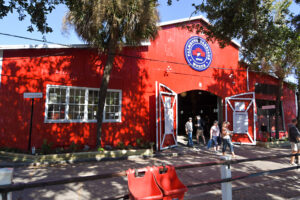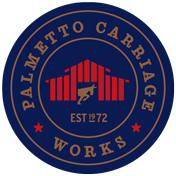
Horse and mule-drawn carriages in Downtown Charleston are not an unusual sight. Passersby often question whether or not the animals are enjoying the work that they do, and if it is safe. At Palmetto Carriage Works, we take pride in the quality of care given to our animals and operate with their health and well-being as the number one priority at all times.
Palmetto Carriage’s downtown barn comfortably holds up to 28 animals at a time in large box stalls. In total, the Palmetto Carriage herd consists of between 40 – 50 horses, but that number is always changing as animals rotate in and out. When the horses and mules are not in the Downtown barn, they spend time at the family farm on John’s Island, about 20 miles away. The company has 3 trucks and 3 trailers that can hold up to 30 animals, and regularly rotate the stock. Though it is beneficial for the horses to get time and space in a green pasture, they actually encounter fewer issues in the Big Red Barn than at the farm. The reason for this is the constant care and monitoring they receive in the controlled conditions of the barn, as opposed to the open fields where they have more time on their own.
It’s no question that Charleston summers are hot, and there are times when the heat is too much for our animals to safely work. When the temperature reaches 95 degrees or the humidity index reaches a level of 110, carriage tours are immediately halted. Additionally, Palmetto Carriage Works checks the temperature of each animal before and after every tour, year round, to ensure that it stays within the normal range of 99 to 101 degrees. If the animal’s temperature is too high, it takes a break to cool down. Charleston is one of the only cities in the world where the animals are monitored individually. There has never been a heat-related incident in over 46 years of business. Our horses and mules are also given regular breaks throughout the day. Palmetto Carriage Works animals are required to have a minimum 15 minute break between each tour, however breaks can be closer to 45 minutes in hot weather.
Another common question that we hear often is whether or not the animals like pulling carriages all day. Carriage horses are bred to work in harness, and the exercise keeps them healthy. Horses recognize, respond to, and develop an affection for their drivers. A horse can easily pull a wheeled vehicle that is six times his own weight; however, carriage horses in Charleston only pull half of that. When the animals are not working in and around the barn, they are vacationing at the family farm in Johns Island.
Palmetto Carriage animals see an equine veterinarian a minimum of three times a year. They also see an equine dentist at least annually. If one of our animals needs to be retired from the working herd, we make sure the horse or mule goes to a good home. If that means working within a new owner’s means, we sell them for minimal cost or even give them away. We do this because we build a bond with each one of our animals and we want to do all we can to make sure they continue to have the best care and a good home.
The care that we give to our animals would not be possible without the devoted employees on our staff. Palmetto Carriage employs an average of 70 Charleston area residents per week. Each employee shares our love for these animals and goes above and beyond to ensure their safety and happiness. For more information about our animals, click here.
